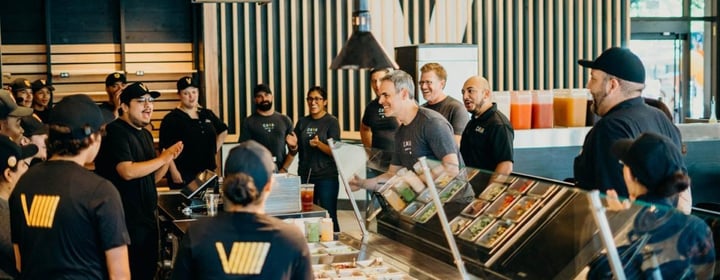
- Home
- Crunchtime Blog
- How to Manage & Empower Restaurant Managers

How to Manage & Empower Restaurant Managers
The best restaurant managers are given tools needed to both succeed and hold themselves accountable when they don't.
Restaurant brands are only as successful as their individual locations. Without holding individual managers to the brand standards that guests come to expect, no restaurant can reach its full potential. But it is one thing to demand great performance from individual managers. The best brands empower those managers with tools that help them succeed and hold them accountable when they don't.
Before we get into how to empower your managers to be successful, we need to define success. At the end of the day, it's as easy as answering this one question: is the restaurant they manage meeting your profit expectations?
Sure, you need managers who can keep employees engaged and promote great guest experiences. But in a profitable restaurant, those things are also true because their food and labor operations are properly managed. Make no mistake, food and labor operations are the lifeblood of a restaurant, so managers who optimize food- and labor-related costs are running an efficient operation, and are maximizing the location's potential.
Tools for Success - Identifying and Fixing Mistakes
Profitability is the end result of successful management, not perfect management. Don't expect perfection from managers because mistakes happen. What you should expect is accountability when mistakes happen, and you should expect managers to make the right decisions to fix those mistakes. The best thing you can do is provide the tools that allow for this to happen.
Suppose you discover at the corporate level that there is a large variance between your actual food costs and your theoretical food costs. This is a big problem that needs to be fixed, mainly because it's hurting the critical element of a successfully managed restaurant - profitability. Let's say that in your scenario there are more than 100 store-level managers operating individual locations, so you need to know which stores these variances are coming from. When you're able to identify the primary sources of your AvT food cost variances, your managers need to identify which items are the root cause of their issue and fix them.
Macaroni Grill has done this by using tools that identify variances by store, item, and time. As a result, the brand reduced its food cost variance by 100 basis points and currently sustains a company-wide variance below 2 percent. (Read more: here) Today, each manager has the tools to identify and eliminate these variances. They know they are held accountable when variances happen because the corporate level can view variances by location.
Additionally, staying on top of these issues is easier than ever because store-level processes are managed quickly and efficiently with automated tools. This allows managers to prevent issues from popping up while still doing the things good managers do, i.e. positively engaging with their team members and ensuring their guests are having a good experience.
Click here to read more about CrunchTime's work with Romano's Macaroni Grill.
Data - The Manager's Greatest Tool
Earlier this year, we contributed to Restaurant Business Magazine with a simple thought - successful restaurant managers are like winning coaches. The most notable comparison between the two is their decision making, which stems from the fact that both ensure they have the most accurate data at their disposal before they make a decision.
This is inherently difficult in both scenarios because the stakes are always incredibly high and things around them are moving a million miles a minute. That's why it's imperative that there are no barriers for managers to gain access to pertinent information. A system designed to accelerate and control the flow of information through the restaurant ensures that managers are armed with data that can allow them to be held accountable and make the best possible decisions, ultimately leading their stores towards maximized profits.
Share this post
Related

.jpg?length=720&name=pexels-ketut-subiyanto-4350059%20(1).jpg)
Best Tools & Software for Restaurant Managers

